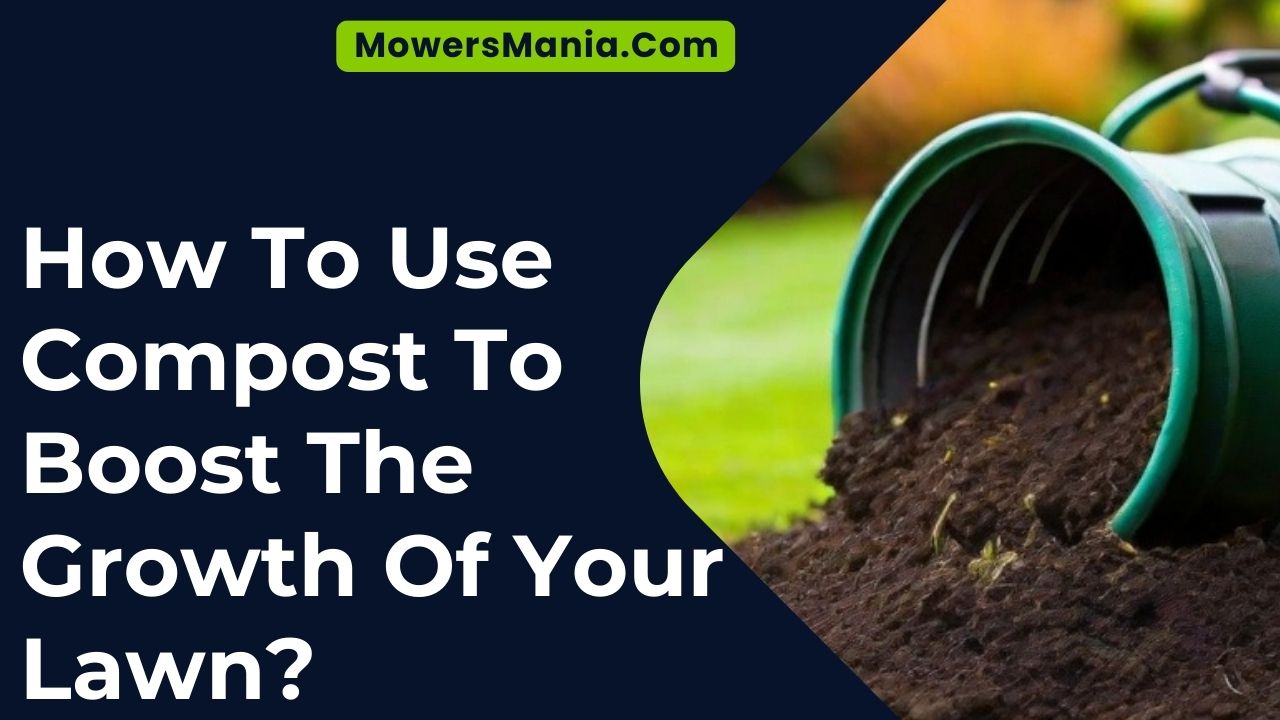Looking to give your lawn a natural boost? Learn how to use compost to revitalize your grass and promote healthy growth.
With the right type of compost and a simple application process, you can transform your lawn into a lush, vibrant space. Say goodbye to chemical fertilizers and hello to a more sustainable approach to lawn care.

Let’s dive in and discover the benefits of incorporating compost into your lawn care routine.
Benefits of Using Compost on Your Lawn
Regularly incorporating compost into your lawn maintenance routine can significantly improve soil health and enhance the overall vitality of your grass. Compost acts as a natural fertilizer, enriching the soil with essential nutrients like nitrogen, phosphorus, and potassium.
This helps to promote robust root development, leading to healthier, more resilient grass that’s better able to withstand environmental stressors such as drought or disease.
Furthermore, the organic matter in compost improves soil structure, aiding in water retention and drainage. This means that your lawn will be better equipped to handle both heavy rainfall and dry spells, reducing the likelihood of waterlogging or parched, brown patches.
Additionally, the improved soil structure allows for better air circulation to the roots, fostering a healthier underground environment for your grass to thrive.
Using compost also encourages beneficial microbial activity in the soil, which can aid in breaking down organic matter and making nutrients more readily available to your grass.
This natural process promotes a balanced and sustainable ecosystem within your lawn, supporting long-term growth and vitality.
Types of Compost for Lawn Growth
When considering the types of compost for lawn growth, it’s important to understand how different compost materials can further enhance the vitality and resilience of your grass.
Choosing the right compost can make a significant difference in the overall health and appearance of your lawn.
Here are some types of compost that are beneficial for your lawn:
- Manure Compost: Rich in nutrients, manure compost can improve soil structure and promote healthy grass growth.
- Leaf Mold: Made from decomposed leaves, leaf mold adds organic matter to the soil, enhancing its water retention and aeration.
- Grass Clipping Compost: Grass clippings break down quickly and provide a good source of nitrogen, helping to promote lush, green grass.
- Kitchen Waste Compost: Utilizing kitchen scraps like fruit and vegetable peels, this compost enriches the soil with essential nutrients.
- Mushroom Compost: A blend of organic materials such as straw, horse manure, and other compost, mushroom compost is an excellent soil conditioner and fertilizer.
Each type of compost offers unique benefits, so consider your lawn’s specific needs when selecting the right compost for optimal growth.
Incorporating Compost Into Your Lawn Care Routine

To enhance the growth of your lawn, consider incorporating compost into your lawn care routine by regularly applying the appropriate type of compost.
Start by mowing your lawn to a shorter length than usual to allow the compost to reach the soil more effectively.
Then, spread a thin layer of compost evenly over the entire lawn using a rake or a compost spreader.
Make sure to choose a compost that’s suitable for your specific soil type and lawn needs, such as compost with added nutrients for a nutrient-poor soil or compost with moisture-retaining properties for a dry lawn.
After applying the compost, water your lawn thoroughly to help the compost settle into the soil.
This process can be repeated every 1-2 months during the growing season to continually improve the health and vitality of your lawn.
Applying Compost to Boost Lawn Growth
To boost the growth of your lawn, apply a thin layer of compost evenly over the entire lawn, ensuring it reaches the soil effectively and provides essential nutrients. This will help improve soil structure, water retention, and overall lawn health.
Here’s how to apply compost to your lawn effectively:
- Prepare the Area: Before applying the compost, mow the lawn to a short height and remove any thatch or debris to allow the compost to reach the soil.
- Spread the Compost: Use a shovel or mechanical spreader to evenly distribute a thin layer of compost over the entire lawn. Aim for a thickness of about 1/4 to 1/2 inch.
- Water the Lawn: After applying the compost, water the lawn thoroughly to help the compost settle into the soil and activate the nutrients.
- Repeat as Needed: For best results, repeat the compost application once or twice a year to continually improve the soil and provide essential nutrients for your lawn.
- Monitor the Results: Keep an eye on the lawn after applying compost to observe the improved growth, soil quality, and overall health of your lawn.
Maintaining a Compost-Enhanced Lawn

After applying compost to boost your lawn’s growth, you can maintain the enhanced lawn by regularly mowing, watering, and monitoring its health.
Mowing your lawn to the recommended height for your grass type encourages a thicker, healthier lawn.
Aim to mow when the grass is dry and use a sharp mower blade to prevent tearing the grass. Water your lawn deeply and less frequently to promote deep root growth.
Monitor your lawn for signs of stress, such as discoloration or wilting, and adjust your maintenance practices accordingly. Additionally, consider the following tips to ensure the ongoing health of your compost-enhanced lawn:
| Maintaining a Compost-Enhanced Lawn |
|---|
| 1. Mow at the recommended height for your grass type |
| 2. Water deeply and less frequently |
| 3. Monitor lawn health and adjust maintenance practices |
Frequently Asked Questions (FAQs)
Can I Use Compost Made From Kitchen Scraps and Yard Waste, or Do I Need to Purchase Specific Compost for Lawn Growth?
You can use compost made from kitchen scraps and yard waste to boost lawn growth. It’s an eco-friendly option that adds nutrients to the soil. No need to purchase specific compost – homemade compost works great!
Is There a Specific Time of Year That Is Best for Applying Compost to My Lawn?
You should apply compost to your lawn in the early spring or fall for best results. This allows the compost to break down and release nutrients gradually, promoting healthy growth and strong roots.
How Long Does It Typically Take to See Results From Using Compost on My Lawn?
Typically, you’ll notice results from using compost on your lawn within a few weeks. The organic matter in the compost promotes healthy soil, which in turn supports lush, green grass growth. Keep up the good work!
Are There Any Specific Types of Grass or Soil That Benefit the Most From Using Compost?
For your lawn, specific grass types like fescue, ryegrass, and bluegrass, as well as sandy or clay soil, benefit most from compost. It improves soil structure, water retention, and provides essential nutrients for healthy growth.
Can I Over-Apply Compost to My Lawn, and if So, What Are the Potential Consequences?
You can over-apply compost to your lawn. Excessive compost can lead to nutrient imbalances, waterlogging, and plant stress. It’s important to use compost in moderation to avoid potential negative consequences.
Conclusion
In conclusion, using compost to boost the growth of your lawn is a simple and effective way to improve the health and appearance of your grass.
By incorporating compost into your lawn care routine and applying it regularly, you can provide essential nutrients and improve soil structure.
With proper maintenance, your compost-enhanced lawn will thrive and become the envy of your neighborhood.
So, grab some compost and get ready to see your lawn flourish!



